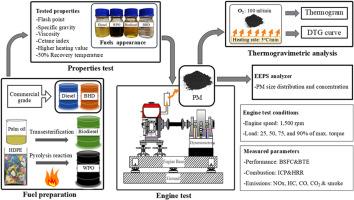柴油发动机应用中废物和生物衍生燃料的颗粒物质特性和排放
IF 6.5
Q2 ENGINEERING, ENVIRONMENTAL
引用次数: 0
摘要
与传统柴油相比,本研究评估了从废塑料油、棕榈油生物柴油和生物氢化柴油中提取的替代柴油的性能、排放和颗粒物质特征。实验使用一台转速为1500转的单缸柴油机,在四种发动机负荷条件下(25%、50%、75%和90%)进行。传统柴油一贯表现出最高的热效率和最低的制动油耗,特别是在75%的负荷下。相比之下,生物氢化柴油在最高负荷下的氮氧化物减排效果最大,排放量比柴油低89.7%。棕榈生物柴油显示出最低的碳氢化合物和烟雾排放,特别是在最高负荷下,与柴油相比减少了46%以上的烟雾。颗粒物分析表明,生物柴油在低负荷时产生高浓度的成核型颗粒,而柴油和废塑料油在最高负荷时产生较大的积累型颗粒。热分析表明,与柴油和废塑料油相比,生物柴油中的颗粒物质在较低的温度下开始氧化,这反映了由于氧气含量较高而增强的反应性。值得注意的是,废塑料油中的颗粒物在氧化后仍能保持约10%的质量,这表明了排放控制的潜在挑战。总的来说,虽然传统柴油保留了性能优势,但每种替代燃料都具有特定的环境效益。研究结果支持废物和生物衍生燃料在减少有害排放和颗粒物质方面的潜力,尽管需要进一步优化燃料配方和后处理策略,以提高其在可持续运输应用中的实际可行性。本文章由计算机程序翻译,如有差异,请以英文原文为准。

Particulate matter characteristics and emissions of waste- and bio-derived fuels in diesel engine applications
This study evaluates the performance, emissions, and particulate matter characteristics of alternative diesel fuels derived from waste plastic oil, palm oil-based biodiesel, and bio-hydrogenated diesel, compared with conventional diesel. The experiments were conducted using a single-cylinder diesel engine operated at 1500 rpm under four engine load conditions (25 %, 50 %, 75 %, and 90 %). Conventional diesel consistently demonstrates the highest thermal efficiency and lowest brake-specific fuel consumption, particularly at the 75 % load. In contrast, bio-hydrogenated diesel achieves the greatest nitrogen oxide reduction, with 89.7 % lower emissions compared with diesel at the highest load. Palm biodiesel shows the lowest hydrocarbon and smoke emissions, especially at the highest load, reducing smoke by over 46 % compared with diesel. Particulate matter analysis revealed that biodiesel produces high concentrations of nucleation-mode particles at a low load, while diesel and waste plastic oil generate larger accumulation-mode particles at the highest load. Thermal analysis indicated that particulate matter from biodiesel begins oxidation at lower temperatures than that from diesel and waste plastic oil, reflecting enhanced reactivity due to a higher oxygen content. Notably, particulate matter from waste plastic oil retains approximately 10 % of its mass after oxidation, suggesting potential challenges for emission control. Overall, while conventional diesel retains performance advantages, each alternative fuel offers specific environmental benefits. The findings support the potential of waste- and bio-derived fuels to reduce harmful emissions and particulate matter, although further optimisation of fuel formulation and after-treatment strategies is needed to enhance their practical viability for sustainable transportation applications.
求助全文
通过发布文献求助,成功后即可免费获取论文全文。
去求助
来源期刊

Cleaner Engineering and Technology
Engineering-Engineering (miscellaneous)
CiteScore
9.80
自引率
0.00%
发文量
218
审稿时长
21 weeks
 求助内容:
求助内容: 应助结果提醒方式:
应助结果提醒方式:


